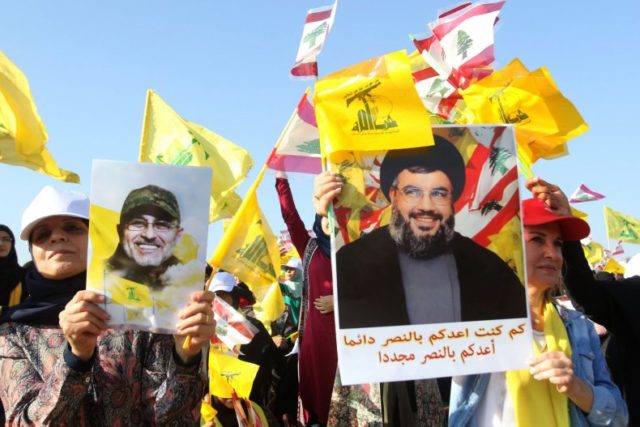Event Date: May 14, 2020
What does it mean for Israel that even before the coronavirus pandemic shutdown Lebanon faced its most severe economic crisis in decades? Street protests brought down one government last October, inflation has jumped at least 50 percent since January, and renewed demonstrations against a new, Hezbollah-dominated administration began at the end of April
What does it mean that Iran, although reeling from the pandemic and international economic sanctions, continues expansionist, anti-Israel policies?
The short answer, according to Israel Defense Forces Brig. Gen. Assaf Orion (Ret.): both opportunities and challenges. In a Jewish Policy Center conference call on May 14, Orion said Israel was glad Germany recently labeled Hezbollah (the Iranian-backed Lebanese Shi’ite “Party of God”) a terrorist organization.
In doing so, he noted, Berlin joined the United States, United Kingdom, the Netherlands, and other countries. The more pressure on Hezbollah and its Iranian backer, especially if the terrorist label reduces or ends Hezbollah’s financial activity in Germany, the better.
A defense strategist at the Washington Institute for Near East Policy and former chief of the strategic division in the planning directorate of the IDF General Staff, Orion said that since Israel’s 2006 war against Hezbollah both parties have been preparing seriously for the next conflict. He reminded call participants that senior Israeli officials have said a resumption of hostilities is a matter of “not if but when.”
Damaging Capabilities
“The capabilities of both sides to inflict heavy damage has seriously increased,” Orion cautioned. In 2006, Hezbollah fired “4,000 rockets into Israel in a month or so.” Now the figure could be “around 1,000 to 2,000 per day” with greater accuracy and bigger warheads. In retaliation, Israel “has the capability to strike thousands of targets in Lebanon per day,” 100 times more than in 2006.
Hezbollah’s “precision project” is meant to increase the guided munitions component of its rocket and missile force, Orion noted. “But our leadership already has said it won’t accept that,” hence the repeated Israeli strikes against Hezbollah’s Iranian-supplied missile facilities.
Neither side wants war now, the analyst said, but a mistake could lead to conflict.
Worsening the situation is the erosion of the post-2006 war truce arrangements under U.N. Security Council Resolution 1701. This called for, among other things, Hezbollah’s demilitarization.
Instead, the movement’s “political influence over Lebanon has seriously increased” while its rocket arsenal, estimated at approximately 12,000 14 years ago, now tallies approximately 130,000 to 150,000, Orion said. And though Hezbollah lost an estimated 2,000 fighters helping Iran sustain dictator Bashar al-Assad in Syria’s 2011 – 2020 civil wars, it also gained operational experience.
Two years ago, Israel exposed six Hezbollah cross-border tunnels. Recently the group attempted to penetrate Israel’s border fence in three places. Meanwhile, “ongoing harassment and interference with UNIFIL [the United Nations Interim Force in Lebanon] … pretty much neutralized and deterred [the force] from reporting the truth” about Hezbollah’s expanded operations in southern Lebanon, Orion said.
Conflict Triggers
He outlined four potential triggers to open Israeli-Hezbollah conflict:
- An American or Israeli attack on Iran’s nuclear program, “which is advancing”:
- Hezbollah’s precision missile project and “Israel’s resolve to stop it”;
- Hezbollah trying to dig in on the Golan Heights while Israel tries to uproot it; and
- A tactical maneuver on the Blue Line separating Israel and Lebanon that results in casualties and quickly escalates.
Since “the risk for war is growing,” what Orion referred to as “the international community”
should recognize that the post-2006 policy needs to be revised. The Lebanese military’s subordination to Hezbollah, which dominates the new government, is “part of the problem.” But “on the bright side” Lebanon’s economic quagmire increases internal opposition to Hezbollah’s policies.
The United States and other Western countries should hold the Lebanese government accountable and demand it adhere to its commitments, Orion said. Foreign aid to Lebanon and military aid to its armed forces should be “performance-based” and require that Beirut treat Hezbollah as organized crime and a terrorist organization.
Meanwhile, “deconfliction” is needed to prevent escalation, he added. If the 10,000-member UNIFIL international force of professional military personnel will not fulfill its monitoring and reporting mission or is prevented by Hezbollah and the Lebanese Armed Forces from doing so, the United States and other backers should reduce but not eliminate funding. Cuts would signal Lebanon that “this can’t go on.”
Rather than eliminate UNIFIL completely, Israel hopes “to bring some pressure to the U.N. system.”
As for Hezbollah’s dominance of the Lebanese Armed Forces, Orion said “I do think nothing in Lebanon is homogenous.” He believes there are “more positive elements” that should be encouraged but also evaluated “with eyes fully opened.”
Iran, which reportedly has provided Hezbollah up to $700 million annually, “is under great financial pressure.” Orion noted it has been “defaulting on payments to fighters” but continues to provide arms in Syria, Lebanon, and elsewhere. So, Israel strikes “anything” that might help Iran or Hezbollah entrenched themselves in Syria, particularly near or on the Golan Heights.
Regarding Israeli-Palestinian diplomacy, Orion remarked on the “paradox” that while “Israel’s security forces work hard to increase pressure on Palestinian terrorist groups … very few except professional voices are talking about annexation [of West Bank territory] and the peace process because there has been no peace process for a very long time.” He observed that “it’s important to try to get some settlement with the Palestinians to ensure that Israel remains a Jewish and democratic state” but given Palestinian leadership’s rejectionism “there’s not much political interest now.”


